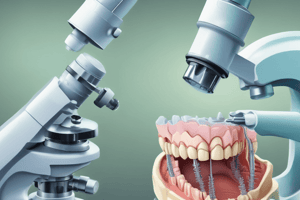Podcast
Questions and Answers
What is the reason that may cause a root canal therapy to fail?
What is the reason that may cause a root canal therapy to fail?
- Improper tooth brushing techniques
- Lack of blood supply to the tooth
- Excessive chewing after the therapy
- Unnoticed canal malformations (correct)
Why should you avoid chewing hard on a tooth after endodontic therapy?
Why should you avoid chewing hard on a tooth after endodontic therapy?
- To avoid discoloration of the tooth
- To speed up the healing process
- It is more prone to fracture until fully restored (correct)
- To test if the therapy was successful
Why does a tooth not become 'dead' after root canal therapy?
Why does a tooth not become 'dead' after root canal therapy?
- It is still supplied by blood vessels in the periodontal ligament (correct)
- It becomes an artificial tooth
- It receives external nutrition through the roots
- It contains synthetic nutrients
What should be done to an endodontically treated tooth before chewing on it?
What should be done to an endodontically treated tooth before chewing on it?
What makes it difficult to endodontically treat a tooth?
What makes it difficult to endodontically treat a tooth?
What contributes to advancing the ability to save teeth through endodontic treatment?
What contributes to advancing the ability to save teeth through endodontic treatment?
When can most endodontic treatments be completed?
When can most endodontic treatments be completed?
What should you do if your tooth lacks sufficient bone support for endodontic treatment?
What should you do if your tooth lacks sufficient bone support for endodontic treatment?
What can make endodontic treatment impossible for a tooth?
What can make endodontic treatment impossible for a tooth?
Why is it important to visit your dentist for full restoration after endodontic treatment?
Why is it important to visit your dentist for full restoration after endodontic treatment?
Flashcards are hidden until you start studying
Study Notes
Introduction to Endodontics
- Endodontics is the branch of clinical dentistry that deals with the prevention, diagnosis, and treatment of pathosis of the dental pulp and its sequelae.
- The main aim of endodontic therapy is to maintain vitality of the pulp, preserve and restore teeth with damaged and necrotic pulp, and preserve teeth that have failed previous endodontic therapy.
Scope of Endodontics
- Vital pulp therapy (pulp capping, pulpotomy)
- Diagnosis and differential diagnosis of oral pain
- Root canal treatment of teeth with or without periradicular pathology of pulpal origin
- Surgical management of pathology resulting from pulpal pathosis
- Management of avulsed teeth (replantation)
- Endodontic implants
- Root end resections, hemisections, and root resections
- Retreatment of teeth previously treated endodontically
- Bleaching of discolored teeth
- Coronal restorations of teeth using post and cores
Indications for Nonsurgical Root Canal Treatment
- Symptomatic or asymptomatic irreversible pulpitis, with or without evidence of periapical disease
- Necrotic pulp with or without evidence of periradicular disease
- Teeth with a pulp that would be compromised during dental procedures
- Restorative reason when a placement of a core and possibly a post is necessary for retention of a fixed restoration
- Cracked or fractured teeth with pulpal involvement
- Teeth with thermal hypersensitivity that significantly interferes with normal function
Contra-Indications for Nonsurgical Root Canal Treatment
- Non-restorable teeth
- Insufficient periodontal support
- Vertical fracture
- Condition of the remaining dentition
- Non-strategic teeth
Who Performs an Endodontic Therapy?
- General dentists often refer patients to endodontists
- Endodontists are specialists who undergo additional training in endodontics after completing dental school
Why Do I Feel Pain?
- Infected pulp causes increased blood flow and cellular activity, leading to pressure and pain
- Pulp can die without causing significant pain
How Can You Tell if Pulp is Infected?
- Toothache on taking hot or cold, spontaneous pain, pain on biting or on lying down
- Drainage, swelling, and abscess at the root end
- Sometimes, there are no symptoms
Why Do I Need Root Canal Therapy?
- Tooth will not heal by itself
- Infection may spread around the tissues, causing destruction of bone and supporting tissue
- Root canal treatment is done to save the damaged pulp by thorough cleaning and shaping of the root canal system and filling it with gutta-percha
Alternatives to Root Canal Therapy
- Extraction is the only alternative if the tooth is seriously damaged and its support is compromised
What is Root Canal Procedure?
- Numbing the area with local anesthetic
- Isolating the tooth with a rubber sheet
- Making an opening in the crown of the tooth
- Cleaning the pulp from the pulp chamber and root canals
- Filling the root canals with gutta-percha
- Restoring the tooth with a crown or other restoration
What are Risks and Complications?
- Over 95% of endodontic therapy cases are successful
Studying That Suits You
Use AI to generate personalized quizzes and flashcards to suit your learning preferences.




